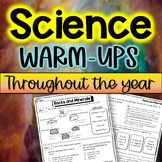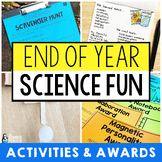222 results
High school chemistry teacher manuals in English (UK)
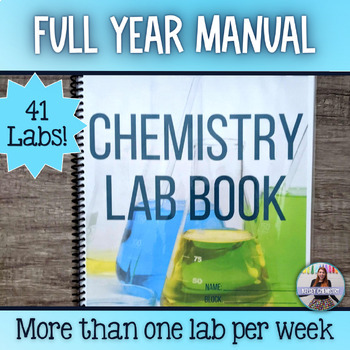
Chemistry Lab Manual Book, 41 Labs, High School Lab Activities, Full Year
Chemistry labs are tough to come by and often have a laundry list of specific chemicals you'll need to make them happen. This lab book is a full year's worth of chemistry lab activities with a very simple list of materials you'll need. In fact, I was able to do upwards of 90% of these labs in my art classroom turned chemistry "lab." This very easily could be translated to a homeschool chemistry lab book or chemistry lab manual- most of the materials are so simple you could use them in your kit
Subjects:
Grades:
10th - 12th
NGSS:
HS-PS1-1
, HS-PS1-4
, HS-PS1-5
, HS-PS1-7
, HS-PS1-3
...
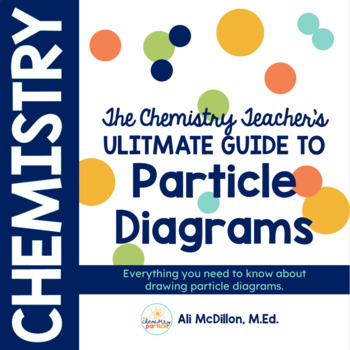
The Chemistry Teacher's Ultimate Guide to Particle Diagrams
The Chemistry Teacher's Ultimate Guide to Particle Diagrams is a reference guide for any chemistry teacher that wants to enhance student comprehension fast!This guide is a culmination of 10 years of teaching chemistry with particle diagrams. This guide shows you what particle diagrams might look like for different chemical concepts and gives tips for helping students build their own mental models of matter. Diagrams included for:Particle basicsproperties of matter (mass, volume, density)changes
Subjects:
Grades:
9th - 11th
Also included in: Full Year of Chemistry Notes | High School Chemistry
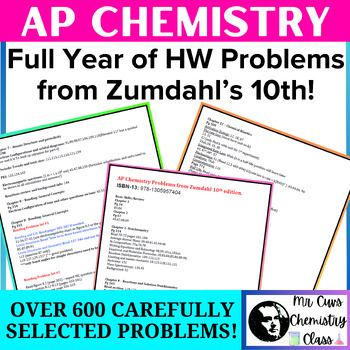
Advanced Placement AP Chemistry Zumdahl HW Problems for the Entire YEAR!
Topics Included in the selected problems include: Stoichiometry, Chemical Reactions, Solutions (Basic and Advanced), Gases, Electrons, Atomic Structure, Light, Periodicity, PES, Molecular Structure, Bonding, Intermolecular Forces, Properties of Solids and Liquids, Kinetics, Equilibrium, Acid-Base Equilibrium, Solubility Product Constant, Thermochemistry, and Electrochemistry. This resource is truly of a "one of a kind" item on TPT and I hope that you will find it useful for your AP Chemistry
Subjects:
Grades:
10th - 12th, Higher Education
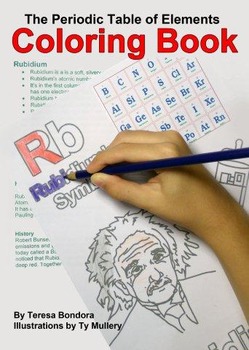
The Periodic Table of Elements Coloring Book (Sample)
A coloring book to familiarize the user with the Primary elements in the Periodic Table. The Periodic Table Coloring Book (PTCB) was received worldwide with acclaim. It is based on solid, proven concepts. By creating a foundation that is applicable to all science (“Oh yes, Hydrogen, I remember coloring it, part of water, it is also used as a fuel; I wonder how I could apply this to the vehicle engine I am studying…”) and creating enjoyable memories associated with the elements science becomes ac
Subjects:
Grades:
PreK - 12th, Higher Education, Adult Education, Staff
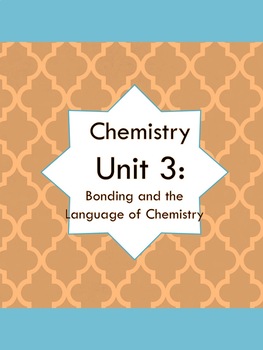
AAAllgood Chemistry Unit 3: Bonding & the Language of Chemistry (Complete Unit)
13 Day Unit Plan for my Unit 3 of Chemistry!!!Included in this Unit Plan you will find EVERYTHING you need to teach this Chemistry Unit. Your purchase includes:PowerPoints and Edpuzzle Video Notes for all topics (see the daily plan)Homework WorksheetsLab’sEngagement ActivitiesManipulativesAnswer Key’sProjectQuizzesUnit Test’s (2 Version's)Daily Plan for what I teach Each Day (All lessons based on 85 minute block schedule)Unit 3 Topics Covered:Lewis Dot DiagramsIonic Naming and Formula WritingCov
Subjects:
Grades:
10th - 12th
Also included in: AAAllgood Chemistry *ENTIRE COURSE PLAN* Bundle
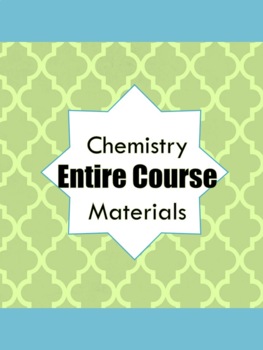
AAAllgood Chemistry *ENTIRE COURSE PLAN* Bundle
All seven units of my semester long chemistry course bundled! Included in this course bundle you will find EVERYTHING you need to each this Chemistry Unit.Your purchase includes:PowerPoints and/or Edpuzzle Video Notes for all topics (see the daily plan)Homework WorksheetsLab’sEngagement ActivitiesManipulativesAnswer Key’sProjectQuizzesUnit Test’sDaily Plan for what I teach Each Day (All lessons based on 85 minute block schedule)Additional Bonus Item for people who purchase the bundle:Daily Quest
Subjects:
Grades:
9th - 12th

CHEMSITRY GRADE 10 - 12 BOOKLET
The material covers GCSE chemistry concepts from Grade 10 to Grade 12.You will find simplified notes of various chemistry concepts intended for your learners. Use this material to help you explain to your learners the chemistry concepts in a simple way. The material can also serve as class notes.
Subjects:
Grades:
10th - 12th

QLD - 11 Chemistry - Complete Teacher's Notes (with all answers)
Complete QLD Year 11 Chemistry (Units 1-2) Teacher's Notes (including answers for all worked solutions) with 13 topics:1. Atomic structure and isotopes2. Periodic table and trends3. Bonding and Properties4. Elements, compounds, and mixtures5. Analytical techniques6. Thermochemistry7. The moles8. Intermolecular forces9. Gases10. Chromatography11. Aqueous solutions and solubility12. Acids, bases, and pH13. Rates of reactionsNote: a PDF copy of a PowerPoint presentation and PDF copy of a worksheet/
Subjects:
Grades:
11th, Staff
Types:
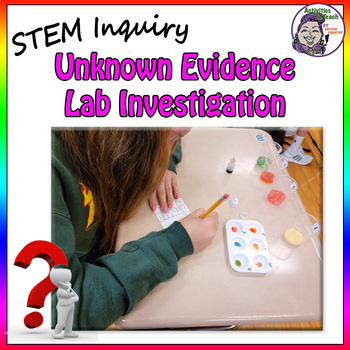
Forensics: Testing to Identify Unknown Powders & Liquids (STEM)
Inquiring minds want to know - What trace evidence was found? What is that white powder? What are those different clear liquids?This hands-on inquiry activity is designed to put the students in the driver's seat as the work to identify what powder or liquid is in the evidence bag. Student execute a lab experiment to cause a color change reaction using Universal Indicator solution. Students have to make pre-testing observations, test the substances and solution, make observation, record reactions
Subjects:
Grades:
7th - 12th
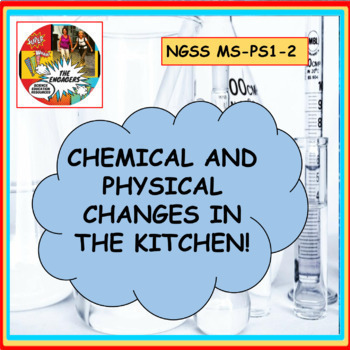
Investigating Chemical and Physical Changes in the Kitchen NGSS MS- PS1-2
These engaging activities (GOOGLE and PDF versions) allow students to gain a greater understanding that the everyday substances that we drink and eat are chemicals and that chemical and physical changes are commonplace. These activities can be done at home or in school.Students will read about the differences between chemical and physical changes. They will then carry out 8 activities using foods commonly used in the kitchen and they will decide if the changes they observe are chemical or physic
Subjects:
Grades:
5th - 9th
NGSS:
MS-PS1-2
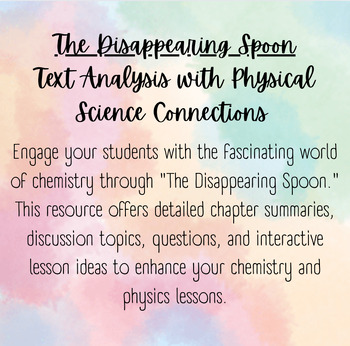
Comprehensive Text Analysis and Discussion Guide for "The Disappearing Spoon" by
Overview: Dive deep into the fascinating world of chemistry with our comprehensive text analysis and discussion guide for "The Disappearing Spoon" by Sam Kean. This resource is designed for high school science educators looking to enhance their chemistry and physics lessons by connecting them to the captivating stories and scientific principles presented in the book.Product Highlights:Detailed Chapter Summaries: Each chapter is summarized to highlight key concepts, scientific discoveries, and hi
Grades:
8th - 12th
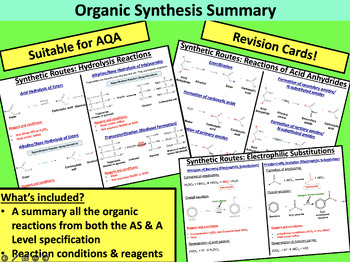
Synthetic Routes Revision (AQA)
A 16 page pdf summary of all the organic synthesis reactions from the AS and A level AQA Chemistry specification. Students will be able to use this resource directly as part of their revision on organic synthesis/synthetic routes or can make flashcards from them. Reagents and reaction conditions are also included where applicableReaction summaries include:nucelophilic substitution reactions* elimination reactions* free radical substitution reactions* electrophilic addition reactions* oxidation r
Subjects:
Grades:
11th - 12th
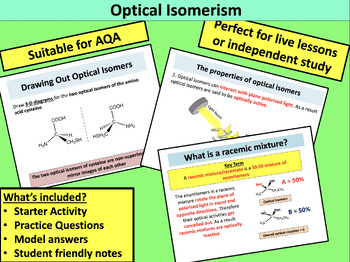
Optical Isomerism
A complete lesson including starter activity, AfL work tasks and main work tasks (all with answers included) on Optical Isomerism. Suitable for AQA A level Chemistry.By the end of this lesson KS5 students should be able to:To know which types of molecules show optical isomerismTo be able to represent enantiomers as 3D molecules showing the chiral centresTo understand why racemic mixtures are optically inactiveDeclaimer: Please refrain from purchasing this popular resource for an interview lesson
Subjects:
Grades:
10th - 12th
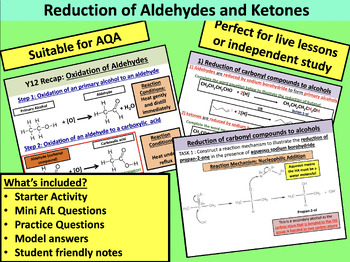
Reduction of Aldehydes and Ketones
A complete lesson including starter activity, AfL work tasks and main work tasks (all with answers included) on the Reduction of Aldehydes and Ketones. Suitable for AQA A level ChemistryBy the end of this lesson KS5 students should be able to:To review the oxidation of alcohols using Cr2O72-/H+ to form aldehydes, ketones and carboxylic acidsTo understand nucleophilic addition reactions of aldehydes and ketones with NaBH4 to form alcoholsTo construct the mechanism for nucleophilic addition reacti
Subjects:
Grades:
10th - 12th
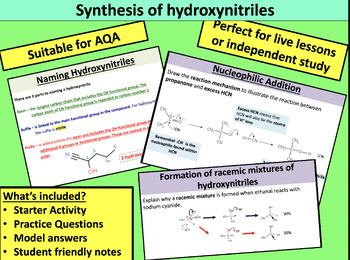
Synthesis of Hydroxynitriles
A complete lesson including starter activity, AfL work tasks and main work tasks (all with answers included) on Synthesis of Hydroxynitriles. Suitable for AQA A level Chemistry.By the end of this lesson KS5 students should be able to:To know how to name hydroxynitrilesTo understand the steps of the nucleophilic addition reaction mechanism to form hydroxynitrilesTo be able to explain how a racemic mixture of hydroxynitriles can be producedDeclaimer: Please refrain from purchasing this popular res
Subjects:
Grades:
10th - 12th
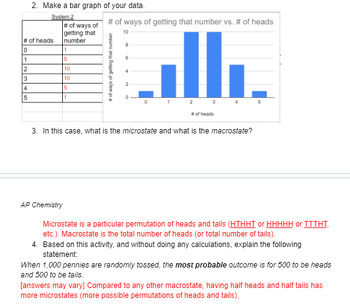
AP Chemistry 9.1 Intro to Entropy Guided Inquiry Investigation Teacher Guide
This is the teacher guide that accompanies a guided inquiry investigation for AP Chemistry standard 9.1 Intro to Entropy. Students use the statistical definition of entropy as the number of microstates that correspond to a particular macrostate. Students use several different statistical models to draw conclusions about the relationship between entropy, statistics, temperature, diffusion, and states of matter. Teacher notes and answers are written in red.
Subjects:
Grades:
9th - 12th
NGSS:
HS-PS3-4
Also included in: AP Chemistry 9.1 Intro to Entropy Guided Inquiry Investigation
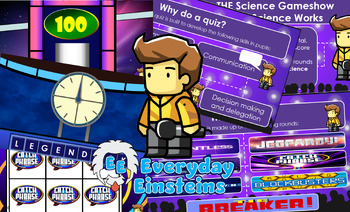
THE Ultimate Science Quiz Show Game- How Science Works & The Scientific Method
A MASSIVE and immersive quiz with 6 classic game show rounds with 60+ questions on How Science Works, The Scientific Method and Mathematical Skill! Set it as homework before the exams, as an independent task or play with your learners! Great for an end of year quiz! This project has been an incredibly labour of love which has taken many, many hours to complete. I know you and your learners will enjoy the challenges! Rounds include:• Pointless. The aim of the game is to score the lowest number of
Subjects:
Grades:
8th - 11th
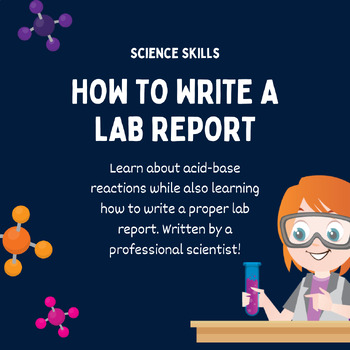
How to Write a Lab Report - With Bath Bombs!
Teach your students how to write a proper lab report with a simple acid-base experiment. Students get to go home with the results - an ideal bath bomb with all the wonderful fizziness you could have. This resource includes a teacher handout (to take you through each step of the report) and a slideshow that takes the class through each segment of a lab report. In the experiment, student will test the acid:base ratio that works best to create optimal fizz.A great lab to last you for a few days of
Subjects:
Grades:
6th - 9th
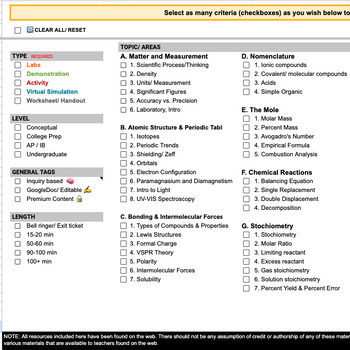
Chemistry Resource Guide & Lesson Planner - Search over 200+ items
Looking for a tool to streamline your lesson planning and diversify your options? Look no further – our Chemistry Resource Guide and Lesson Planner is here to help your lesson planning!Unlock 200+ Resources: Goodbye to endlessly searching for quality teaching materials. Our resource guide boasts a library of over 200+ resources, handpicked and curated to cover all essential topics in the chemistry curriculum. Labs, Demonstrations, Activities, and More: Choose from a collection of labs, captivat
Subjects:
Grades:
8th - 12th, Higher Education, Adult Education, Staff
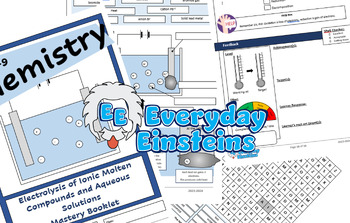
THE Ultimate Taskbook: GCSE Chemistry Electrolysis
This ULTIMATE Taskbook of Electrolysis covers the key concepts of setting up an electrolytic cell, the movement of ions in molten ionic compounds and aqueous ionic solutions and explores the industrial use of cryolite and bauxite in the extraction of molten aluminium.The Taskbook contains a range of activities from word searches, crosswords and word fit puzzles to true or false, match ups and word fill tasks.Aimed at Year 10-11 as revision or a teaching tool alongside classroom practice. It hits
Subjects:
Grades:
9th - 11th
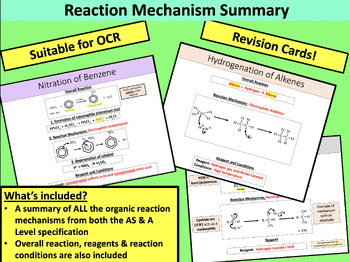
A level Chemistry: Reaction Mechanisms (OCR)
18 flashcards on Reaction Mechanisms from both Year 12 and 13 content. Suitable for the OCR A level Chemistry SpecificationReaction mechanisms included are:Free Radical SubstitutionNucleophilic SubstitutionElectrophilic AdditionElectrophilic SubstitutionNucelophilic AdditionPRINTING: These can be printed as A6 flashcards (1/4 size of A4) by printing four pages per sheet
Subjects:
Grades:
10th - 12th
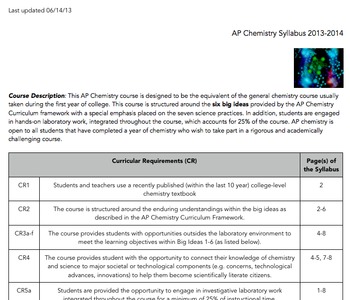
College Board Approved Editable AP Chemistry Syllabus
Creating a syllabus from scratch for the college board was a HUGE undertaking and caused a ton of frustration but now that it's all behind me and I've completely a college board approved syllabus, I'd be happy to share an editable to make everyone else's life MUCH easier.
This syllabus took hours to make and days to receive approval (along with three edits!). Download, make it your own, and submit it. Easy as that!
Subjects:
Grades:
11th - 12th, Higher Education

QLD - 11 Chemistry - Complete PDF presentations and handouts
Complete QLD Year 11 Chemistry (Units 1-2) contents with 13 topics: 1. Atomic structure and isotopes 2. Periodic table and trends3. Bonding and Properties4. Elements, compounds, and mixtures5. Analytical techniques6. Thermochemistry7. The moles8. Intermolecular forces9. Gases10. Chromatography11. Aqueous solutions and solubility12. Acids, bases, and pH13. Rates of reactions Each topic includes 2 files: a PDF copy of a PowerPoint presentation and a second PDF copy of a worksheet/handout Word docu
Subjects:
Grades:
11th
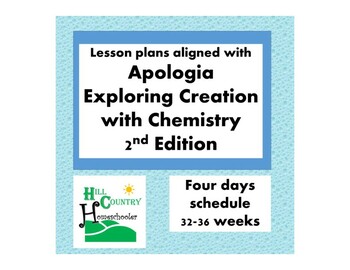
Apologia Exploring Creation with Chemistry 2nd Edition Lesson Plan Schedule
This lesson plan is aligned with the 2nd edition of Apologia's Chemistry textbook. The schedule is designed for four days per week of student work for 32-36 weeks, depending on whether the quarterly tests are used or not. The schedule includes time for all the experiments, reading, vocabulary, questions, practice problems, module tests, and quarterly tests. (This product is only the lesson schedule; the experiments, questions, practice problems, and tests are found in the textbook and solutions
Subjects:
Grades:
9th - 12th
Types:
Showing 1-24 of 222 results



